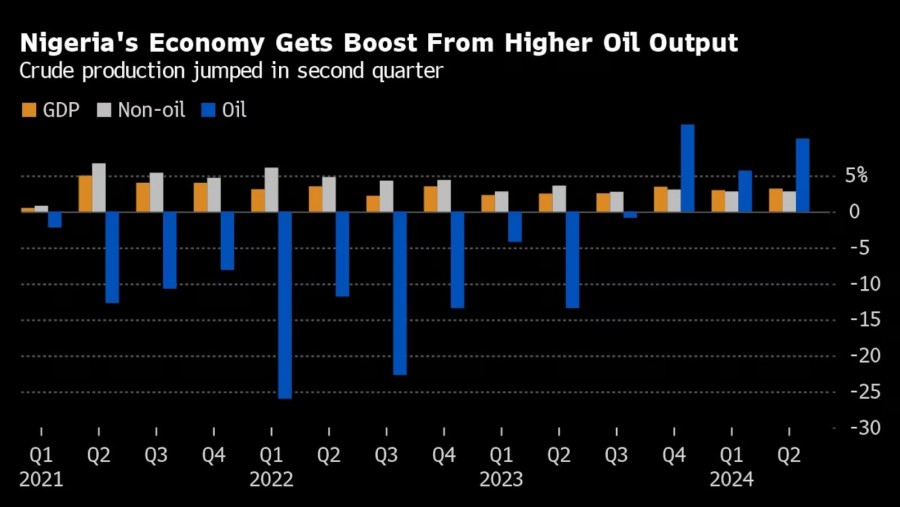Nigeria’s economy grew at a faster pace in the second quarter, helped by higher crude production that offset the impact of the naira’s devaluation on non-oil industry growth.
Gross domestic product expanded an annual 3.19% in the three months through June, compared with 2.98% in the previous quarter, according to data released by the Abuja-based National Bureau of Statistics on Monday. The figure matched the median estimate of four economists in a Bloomberg survey.
Output in Nigeria has been boosted by a series of economic reforms that President Bola Tinubu has unleashed since coming to power in May 2023 to attract foreign investment. The authorities are targeting growth of 3.8% this year, compared with 2.7% last year, and a return to 6% — a rate it last achieved in 2014 — in the coming years, according to Finance Minister Wale Edun.
While output is likely to get a boost from a stabilization of the inflation rate over the coming months — to around 28% by year end, a growth rate of more than 4% is unlikely to be achieved until 2025, said Razia Khan, chief economist for Africa and the Middle East at Standard Chartered Bank
Still, the increase in oil output, if sustained, could lift growth closer to the government’s target. Crude production grew to 1.41 million barrels per day in the second quarter, compared with 1.22 million barrels per day a year earlier, the statistics office said.
Daily oil output in Nigeria, Africa’s biggest producer, is expected to rise to about 2 million barrels per day by the end of this year, Oritsemeyiwa Eyesan, executive vice president of the Nigerian National Petroleum Corp.’s upstream division, said last week.
The non-oil sector grew 2.8% in the period, down from 3.6% a year ago. Agriculture output slowed to 1.4% from 1.5%.
There are already indications that growth will slow in the second half, said Brendon Verster, an economist at Oxford Economics Africa, who sees an expansion of 2.6% this year. “Nigeria’s purchasing managers index fell below the 50-point expansionary threshold in July, reaching the lowest level since November 2023,” he said.
The International Monetary Fund is a bit more optimistic — it projects that Nigeria’s economy will expand 3.3% this year. That will still lower the Nigerian economy’s ranking to the fourth-largest in Africa behind South Africa, Egypt and Algeria.
source: norvan report
